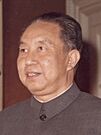Paramount leader facts for kids
Quick facts for kids Supreme leader |
|||||||
|---|---|---|---|---|---|---|---|
| Simplified Chinese | 最高领导人 | ||||||
| Traditional Chinese | 最高領導人 | ||||||
|
|||||||
The Paramount leader (Chinese: 最高领导人; pinyin: Zuìgāo Lǐngdǎorén; literally "highest leader") is an informal name for the most important political person in the People's Republic of China (PRC). This leader usually controls the Chinese Communist Party (CCP) and the People's Liberation Army (PLA). They often hold important titles like CCP General Secretary and Chairman of the Central Military Commission (CMC).
The person who is the President (state representative) or Premier (head of government) is not always the Paramount leader. In China's one-party system, roles within the Chinese Communist Party are more powerful than state titles.
The Paramount leader is not an official job title. This term became well-known during the time of Deng Xiaoping (1978–1989). He had great political power even without holding any major official party or government positions. As the leader of the world's largest economy (by purchasing power) and second largest economy (by total value), the Paramount leader is seen as one of the most powerful political figures globally.
Today, leaders like Jiang Zemin, Hu Jintao, and Xi Jinping have held the formal titles of CCP General Secretary, President of the People's Republic of China, and Chairman of the Central Military Commission. Because of this, they are often called "President" by other countries. However, their real power comes from being the General Secretary of the CCP. This is the most important position in China's political system. The presidency is mostly a ceremonial role, like a symbolic head of state.
Xi Jinping is the current Paramount leader. He took on this role in November 2012 when he became CCP General Secretary. He became president later, in March 2013.
Contents
History of China's Top Leaders
Chairman Mao Zedong was the clear ruler of Communist China from 1949. He held three chairman roles at once. These made him the leader of the party, military, and state. After the Cultural Revolution, many in the party agreed that Mao's strong personal rule caused many problems.
In the 1980s, leaders tried to separate powers more. The roles of General Secretary, President, and Premier were held by different people. For example, in 1985, Hu Yaobang was CCP General Secretary, Li Xiannian was President, and Zhao Ziyang was Premier. But Deng Xiaoping was still seen as the main leader. Even when Hu and Zhao lost power, Deng kept ultimate control.
In 1989, Deng Xiaoping introduced the idea of a "Core Leader." He said that the party didn't have a true "Core Leader" until Mao Zedong in 1935. Mao led the "First Generation" of CCP leadership. Deng said he himself was the "Core" of the "Second Generation." He then asked everyone to support Jiang Zemin as the core of the "Third Generation."
The term "Paramount leader" has also been used for Deng's successors, Jiang Zemin and Hu Jintao. However, they didn't have as much personal power as Deng. There was more focus on "collective leadership." This means the top leader worked with the agreement of the CCP Politburo Standing Committee. This was very clear during Hu Jintao's time.
Starting in 1993, Jiang Zemin held the three main positions:
- General Secretary of the Chinese Communist Party: This is the leader of the party and the most important position in the state.
- Chairman of the Central Military Commission: This is the supreme command of the People's Liberation Army.
- President of the PRC: This is mostly a ceremonial role under the 1982 Constitution.
When Jiang Zemin left his General Secretary and President roles (2002 and 2003), he kept the Chairman of the Central Military Commission position. Military power is very important in China's politics. So, holding the top military job meant Jiang still had some formal power.
Hu Jintao held the same three positions during his time as leader. He passed all three roles to his successor, Xi Jinping. Xi became CCP General Secretary and Chairman of the Central Military Commission in November 2012. He became president in March 2013.
Since Xi Jinping became leader, two new groups have been created. These are the National Security Commission and the Central Comprehensively Deepening Reforms Commission. These groups seem to give the Paramount leader more political power than anyone since Deng. They set the main direction for national security and economic changes. The General Secretary leads both groups.
List of China's Paramount Leaders
| Generation | Paramount Leader | Start | End | Theory |
|---|---|---|---|---|
| First | Mao Zedong Hua Guofeng |
1949 | 1978 | Mao Zedong Thought |
| Second | Deng Xiaoping | 1978 | 1989 | Deng Xiaoping Theory |
| Third | Jiang Zemin | 1989 | 2002 | Three Represents |
| Fourth | Hu Jintao | 2002 | 2012 | Scientific Outlook on Development |
| Fifth | Xi Jinping | 2012 | Xi Jinping Thought |
First administration Second administration Third administration Hu–Wen Administration Xi–Li Administration/Xi Administration
- Bold offices refer to the highest position in the Chinese Communist Party.
| Picture | Name | Offices held | Period | Ideology | CCP leaders | Presidents | Premiers | |
|---|---|---|---|---|---|---|---|---|
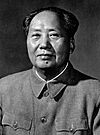 |
Mao Zedong 毛泽东 (1893–1976) |
Chairman of the CCP Central Politburo | 20 March 1943 – 28 September 1956 | 1 October 1949 ↓ 9 September 1976 (26 years, 344 days) |
Mao Zedong Thought | Himself | Himself Liu Shaoqi Post abolished |
Zhou Enlai Hua Guofeng |
| Chairman of the CCP Central Secretariat | ||||||||
| Chairman of the CCP Central Committee | 19 June 1945 – 9 September 1976 | |||||||
| Chairman of the PRC Central People's Government | 1 October 1949 – 27 September 1954 | |||||||
| Chairman of the CPPCC National Committee | 9 October 1949 – 25 December 1954 | |||||||
| Chairman of the CCP Central Military Commission | 8 September 1954 – 9 September 1976 | |||||||
| Chairman of the PRC | 27 September 1954 – 27 April 1959 | |||||||
| Hua Guofeng 华国锋 (1921–2008) |
Premier of the PRC State Council | 4 February 1976 – 10 September 1980 | 9 September 1976 ↓ 22 December 1978 (2 years, 104 days) |
Two Whatevers (Mao Zedong Thought) |
Himself | Post abolished | Himself | |
| First Vice Chairman of the CCP Central Committee | 7 April 1976 – 7 October 1976 | |||||||
| Chairman of the CCP Central Committee | 7 October 1976 – 28 June 1981 | |||||||
| Chairman of the CCP Central Military Commission | ||||||||
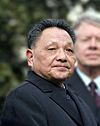 |
Deng Xiaoping 邓小平 (1904–1997) |
First Vice Premier of the PRC State Council | 17 January 1975 – 18 June 1983 | 22 December 1978 ↓ 24 June 1989 (10 years, 184 days) |
Deng Xiaoping Theory (Socialism with Chinese characteristics) |
Hua Guofeng Hu Yaobang Zhao Ziyang Jiang Zemin |
Post abolished Li Xiannian Yang Shangkun |
Hua Guofeng Zhao Ziyang Li Peng |
| Chairman of the CPPCC National Committee | 8 March 1978 – 17 June 1983 | |||||||
| Chairman of the CCP Central Military Commission | 28 June 1981 – 9 November 1989 | |||||||
| Chairman of the CCP Central Advisory Commission | 13 September 1982 – 2 November 1987 | |||||||
| Chairman of the PRC Central Military Commission | 6 June 1983 – 19 March 1990 | |||||||
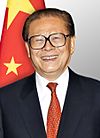 |
Jiang Zemin 江泽民 (1926–2022) |
General Secretary of the CCP Central Committee | 24 June 1989 – 15 November 2002 | 24 June 1989 ↓ 15 November 2002 (13 years, 144 days) |
Three Represents | Himself | Yang Shangkun Himself |
Li Peng Zhu Rongji |
| Chairman of the CCP Central Military Commission | 9 November 1989 – 19 September 2004 | |||||||
| Chairman of the PRC Central Military Commission | 19 March 1990 – 13 March 2005 | |||||||
| President of the PRC | 27 March 1993 – 15 March 2003 | |||||||
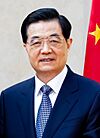 |
Hu Jintao 胡锦涛 (born 1942) |
General Secretary of the CCP Central Committee | 15 November 2002 – 15 November 2012 | 15 November 2002 ↓ 15 November 2012 (10 years, 0 days) |
Scientific Outlook on Development (Socialist Harmonious Society) |
Himself | Wen Jiabao | |
| President of the PRC | 15 March 2003 – 14 March 2013 | |||||||
| Chairman of the CCP Central Military Commission | 19 September 2004 – 15 November 2012 | |||||||
| Chairman of the PRC Central Military Commission | 13 March 2005 – 14 March 2013 | |||||||
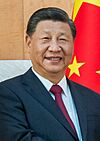 |
Xi Jinping 习近平 (born 1953) |
General Secretary of the CCP Central Committee | 15 November 2012 – incumbent | 15 November 2012 ↓ Incumbent (13 years, 102 days) |
Xi Jinping Thought on Socialism with Chinese Characteristics for a New Era (Chinese Dream) |
Himself | Li Keqiang Li Qiang |
|
| Chairman of the CCP Central Military Commission | ||||||||
| President of the PRC | 14 March 2013 – incumbent | |||||||
| Chairman of the PRC Central Military Commission | ||||||||
| Leader of the CCP Central Comprehensively Deepening Reforms Commission | 30 December 2013 – incumbent | |||||||
| Chairman of the CCP National Security Commission | 25 January 2014 – incumbent | |||||||
Spouses of Paramount Leaders
All six Paramount leaders have been married during their time in office. The current spouse is Peng Liyuan, who is the wife of General Secretary Xi Jinping.
| Picture | Name | Leader | Tenure |
|---|---|---|---|
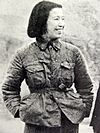 |
Jiang Qing
江青 (1914–1991) |
Mao Zedong | 1 October 1949 – 9 September 1976 |
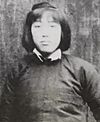 |
Han Zhijun
韩芝俊 (born 1930) |
Hua Guofeng | 9 September 1976 – 22 December 1978 |
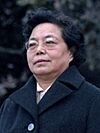 |
Zhuo Lin
卓琳 (1916–2009) |
Deng Xiaoping | 22 December 1978 – 9 November 1989 |
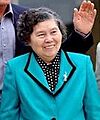 |
Wang Yeping
王冶坪 (born 1928) |
Jiang Zemin | 9 November 1989 – 15 November 2002 |
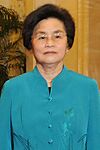 |
Liu Yongqing
刘永清 (born 1940) |
Hu Jintao | 15 November 2002 – 15 November 2012 |
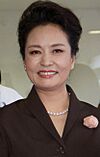 |
Peng Liyuan
彭丽媛 (born 1962) |
Xi Jinping | 15 November 2012 – Incumbent |
See also
- List of Chinese leaders
- Leader of the Chinese Communist Party
- Orders of precedence in the People's Republic of China
- Primus inter pares
 | Sharif Bey |
 | Hale Woodruff |
 | Richmond Barthé |
 | Purvis Young |


